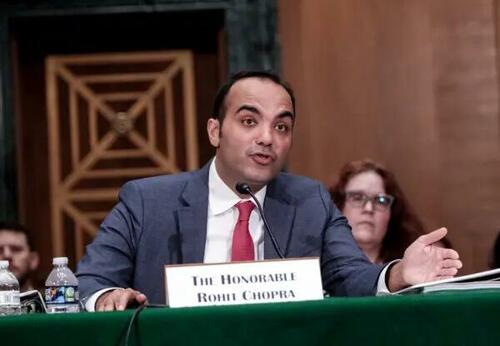
Authored by Tom Ozimek via The Epoch Times (emphasis ours),
The Biden administration has warned U.S. banks and other financial institutions that they can't reject illegal immigrants' credit applications based solely or predominantly on their immigration status.

The Department of Justice (DOJ) and the Consumer Financial Protection Bureau (CFPB) said in a recent statement that rejecting illegal immigrants for credit cards and various types of loans just because they are noncitizens is unlawful.
The two agencies stated that they were issuing the warning "because consumers have reported being rejected for credit cards as well as for auto, student, personal and equipment loans because of their immigration status, even when they have strong credit histories and ties to the United States and are otherwise qualified to receive the loans."
Specifically, the agencies cited the provisions of the Equal Credit Opportunity Act (ECOA), which protects credit applicants from discrimination based on such characteristics as race, religion, sexual orientation, and national origin.
The agencies argue that protections afforded by ECOA and other laws extend to alienage, so banks that have blanket policies to deny loans to illegal immigrants may be breaking the law.
“Lenders should not deny people the opportunity to take out a loan to buy a home, build their businesses or otherwise pursue their financial goals because of unlawful bias and without regard to their actual ability to repay,” Assistant Attorney General Kristen Clarke of the DOJ's Civil Rights Division said in a statement.
“Fair access to credit is crucially important for building wealth and strengthening household financial stability,” CFPB Director Rohit Chopra said in a statement. “The CFPB will not allow companies to use immigration status as an excuse for illegal discrimination.”

Bud Cummins, a former U.S. attorney, objected to the agencies' warning to banks and other financial institutions.
"DOJ and CFPB tell banks it might be illegal to refuse to loan money to people [who] broke federal law to reach the bank. You gotta be kidding me. The invasion of illegal immigrants is intentional and must be stopped," he wrote on X, formerly known as Twitter.
According to the Center for Immigration Studies, there were roughly 11.35 million illegal immigrants residing in the United States as of January 2022.
More Details
The agencies said that ECOA protections extend to alienage, although in a joint statement, they acknowledged some gray area, namely that the act "does not expressly prohibit consideration of immigration status."
Some financial institutions have maintained blanket policies denying people credit based on their immigration status, without regard for their ability to repay, interpreting ECOA in a way that they believe shields them from liability, according to the agencies, which added that this is incorrect.
"A creditor may consider an applicant's immigration status when necessary to ascertain the creditor's rights regarding repayment," the agencies said, explaining that Regulation B, a rule that implements ECOA, expressly states that the only conditions under which immigration status may be considered is only to determine creditors' "rights and remedies regarding repayment" of a loan.
If financial institutions consider immigration status for any other reason, the agencies said they're probably breaking the law.
"Creditors should be aware that unnecessary or overbroad reliance on immigration status in the credit decisioning process, including when that reliance is based on bias, may run afoul of ECOA's antidiscrimination provisions and could also violate other laws," the agencies said.
The "other laws" mentioned could refer to the 1866 Civil Rights Act, also known as Section 1981, which the agencies said in their joint statement "has long been construed to prohibit discrimination based on alienage."
They said that courts have found that "ECOA's prohibition of national origin discrimination and Section 1981's prohibitions complement one another and that discrimination that arises from overbroad restrictions on lending to noncitizens may violate either or both statutes."
It's unclear whether any banks or financial institutions intend to challenge the DOJ and CFPB's interpretation of the law regarding the provision of loans to illegal immigrants.
Authored by Tom Ozimek via The Epoch Times (emphasis ours),
The Biden administration has warned U.S. banks and other financial institutions that they can’t reject illegal immigrants’ credit applications based solely or predominantly on their immigration status.

The Department of Justice (DOJ) and the Consumer Financial Protection Bureau (CFPB) said in a recent statement that rejecting illegal immigrants for credit cards and various types of loans just because they are noncitizens is unlawful.
The two agencies stated that they were issuing the warning “because consumers have reported being rejected for credit cards as well as for auto, student, personal and equipment loans because of their immigration status, even when they have strong credit histories and ties to the United States and are otherwise qualified to receive the loans.”
Specifically, the agencies cited the provisions of the Equal Credit Opportunity Act (ECOA), which protects credit applicants from discrimination based on such characteristics as race, religion, sexual orientation, and national origin.
The agencies argue that protections afforded by ECOA and other laws extend to alienage, so banks that have blanket policies to deny loans to illegal immigrants may be breaking the law.
“Lenders should not deny people the opportunity to take out a loan to buy a home, build their businesses or otherwise pursue their financial goals because of unlawful bias and without regard to their actual ability to repay,” Assistant Attorney General Kristen Clarke of the DOJ’s Civil Rights Division said in a statement.
“Fair access to credit is crucially important for building wealth and strengthening household financial stability,” CFPB Director Rohit Chopra said in a statement. “The CFPB will not allow companies to use immigration status as an excuse for illegal discrimination.”

Bud Cummins, a former U.S. attorney, objected to the agencies’ warning to banks and other financial institutions.
“DOJ and CFPB tell banks it might be illegal to refuse to loan money to people [who] broke federal law to reach the bank. You gotta be kidding me. The invasion of illegal immigrants is intentional and must be stopped,” he wrote on X, formerly known as Twitter.
According to the Center for Immigration Studies, there were roughly 11.35 million illegal immigrants residing in the United States as of January 2022.
More Details
The agencies said that ECOA protections extend to alienage, although in a joint statement, they acknowledged some gray area, namely that the act “does not expressly prohibit consideration of immigration status.”
Some financial institutions have maintained blanket policies denying people credit based on their immigration status, without regard for their ability to repay, interpreting ECOA in a way that they believe shields them from liability, according to the agencies, which added that this is incorrect.
“A creditor may consider an applicant’s immigration status when necessary to ascertain the creditor’s rights regarding repayment,” the agencies said, explaining that Regulation B, a rule that implements ECOA, expressly states that the only conditions under which immigration status may be considered is only to determine creditors’ “rights and remedies regarding repayment” of a loan.
If financial institutions consider immigration status for any other reason, the agencies said they’re probably breaking the law.
“Creditors should be aware that unnecessary or overbroad reliance on immigration status in the credit decisioning process, including when that reliance is based on bias, may run afoul of ECOA’s antidiscrimination provisions and could also violate other laws,” the agencies said.
The “other laws” mentioned could refer to the 1866 Civil Rights Act, also known as Section 1981, which the agencies said in their joint statement “has long been construed to prohibit discrimination based on alienage.”
They said that courts have found that “ECOA’s prohibition of national origin discrimination and Section 1981’s prohibitions complement one another and that discrimination that arises from overbroad restrictions on lending to noncitizens may violate either or both statutes.”
It’s unclear whether any banks or financial institutions intend to challenge the DOJ and CFPB’s interpretation of the law regarding the provision of loans to illegal immigrants.
Loading…






